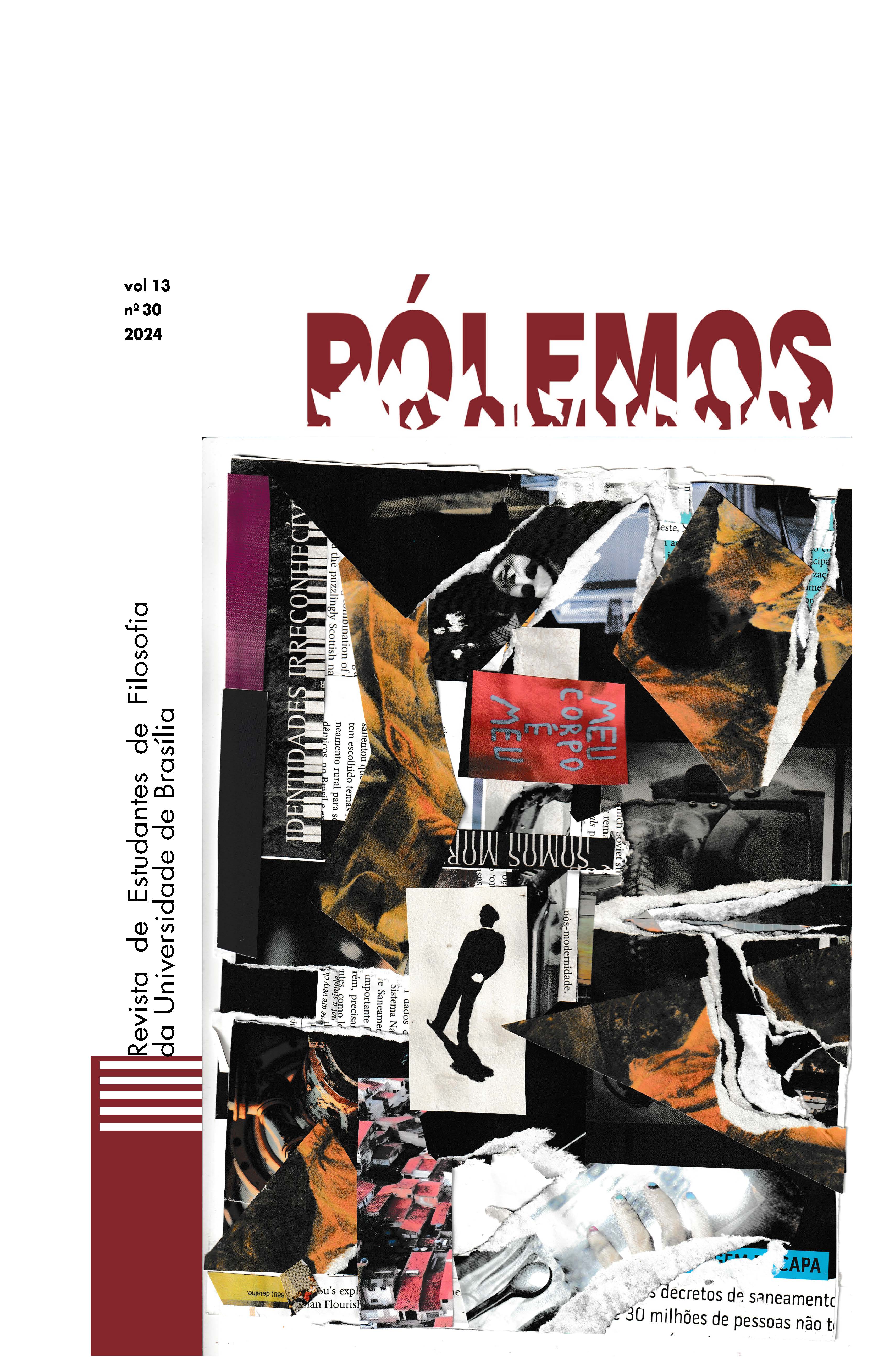MORAL AGENCY BETWEEN ARTIFICIAL INTELLIGENCE AND ROBOTS
DOI:
https://doi.org/10.26512/pl.v13i30.55527Keywords:
Artificial Intelligence. Smart Agents. Moral Agency. Robots. Responsibility.Abstract
This article aims to understand the relationships between artificial intelligence, robots and moral agency philosophically. The advance of artificial intelligence has changed the forms of thought and behavior of human beings in society. For our work, we will start from the following problem: if we attribute to artificial intelligence a moral agency, then artificial intelligence can be morally responsible? Our hypothesis to verify is that if artificial intelligence simulates moral actions in decision making, then a moral agency only simulates forms of moral responsibility. This proposal is justified due to the contemporary importance of philosophy for the understanding and debate of theoretical concepts involving artificial intelligence. These theoretical concepts are intelligent agents, algorithms, machine learning (machine learning), big data (large amount of computable data), cognition, information, logic, neural networks, among others.
Downloads
References
ANGELUCI, Alan; ROSSETTI, Regina. Ética algorítmica: questões e desafios éticos do avanço tecnológico da sociedade da informação. Galáxia, São Paulo, n. 46, 2021, p. 1-18. DOI: https://doi.org/10.1590/1982-2553202150301.
MINDELL, David; REYNOLDS, Elisabeth. Inteligência artificial e trabalho: Panorama setorial da internet. [S.l.]: MIT, 2020.
BEHDADI, D.; MUNTHE, C. A normative approach to artificial moral agency. Minds & Machines, v. 30, p. 195–218, 2020. DOI: https://doi.org/10.1007/s11023-020-09525-8.
BRINGSJORD, Selmer. Artificial intelligence. In: Stanford Encyclopedia of Philosophy. 2018. Disponível em: https://plato.stanford.edu/entries/artificial-intelligence/. Acesso em: 15 abr. 2025.
BRINGSJORD, Selmer. Psychometric artificial intelligence. Journal of Experimental and Theoretical Artificial Intelligence, v. 23, n. 3, p. 271–277, 2011. DOI: https://doi.org/10.1080/0952813X.2010.502314.
CHAMPAGNE, Marc. The mandatory ontology of robot responsibility. Cambridge Quarterly of Healthcare Ethics, v. 30, n. 3, p. 448–454, 2021. Doi: https://doi.org/10.1017/S0963180120000997.
CUPANI, Alberto. Filosofia da tecnologia: um convite. Florianópolis: Editora UFSC, 2016.
DANTAS, Danilo Fraga. Epistemologia Computacional: uma provocação. Revista Perspectiva Filosófica, v. 46, n. 02, pp. 189-221, 2019. DOI: https://doi.org/10.51359/2357-9986.2019.248089.
DARPA. Strategic computing: new-generation computing technology: a strategic plan for its development and application to critical problems in defense. ADA141982, 28 out. 1983.
DENNET, D. Artificial Intelligence as Philosophy and as Psychology. In: RINGLE, Martin. Philosophical Perspectives in Artificial Intelligence. New York: Humanities Press and Harvester Press, 1979, pp. 57-80.
EMBRAPII. Robô Snake promete revolucionar a vistoria de soldas a laser. Publicado em 27 maio 2019. Disponível em: https://embrapii.org.br/robo-snake-promete-revolucionar-a-vistoria-de-soldas-a-laser/. Acesso em: 23 ago. 2024.
EUROPEAN COMMISSION. How Many People Work in Agriculture in the European Union? An Answer Based on Eurostat Data Sources. EU Agricultural Economics Briefs, n. 8, jul. 2013.
FLORIDI, L. The Philosophy of Information. Oxford: Oxford Press, 2011.
FOUCAULT, Michel. Discipline and Punish. Alan Sheridan (trans.). New York: Pantheon, 1975.
FRANSSEN, Maarten, LOKHORST, Gert-Jan and VAN DE POEL, Ibo. Philosophy of Technology. In: ZALTA, Edward N.; NODELMAN, Uri (ed.). The Stanford Encyclopedia of Philosophy, Fall 2024. Disponível em: https://plato.stanford.edu/archives/fall2024/entries/technology/. Acesso em: 23 ago. 2024.
KORB, Kevin B. Introduction: machine learning as philosophy of science. Minds and Machines, v. 14, p. 433–440, 2004. DOI: https://doi.org/10.1023/B:MIND.0000045986.90956.7f.
MCNAMARA, Paul and VAN DE PUTTE, Frederik. Deontic Logic. In: ZALTA, Edward N.; NODELMAN, Uri (ed.) The Stanford Encyclopedia of Philosophy, Fall 2022. Disponível em: https://plato.stanford.edu/archives/fall2022/entries/logic-deontic/. Acesso em: 23 ago. 2024.
MITTELSTADT, B. D. et al. The ethics of algorithms: mapping the debate. Big Data & Society, v. 3, n. 2, p. 1–21, jul./dez. 2016. DOI: https://doi.org/10.1177/2053951716679679.
MÜLLER, Vincent C., Ethics of Artificial Intelligence and Robotics. In: ZALTA, Edward N.; NODELMAN, Uri (ed.). The Stanford Encyclopedia of Philosophy. Fall 2023. Disponível em: https://plato.stanford.edu/archives/fall2023/entries/ethics-ai/. Acesso em: 23 ago. 2024.
NEWELL, N. You can't play 20 questions with nature and win: projective comments on the papers in this symposium. In: CHASE, W. (ed.). Visual information processing. New York, NY: Academic Press, 1973, pp. 1-26.
O’ NEIL, Cathy. Algoritmos de Destruição em Massa. [s/l]: Editora Rua do Sabão, 2020.
O’ NEIL, Cathy. Weapons of Math Destruction: How Big Data Increases Inequality and Threatens Democracy. New York: Crown Publishing Group, 2017.
RULAC. Rule of Law in Armed Conflicts. Legal framework: International humanitarian law. 2017. Disponível: https://www.rulac.org/legal-framework/international-humanitarian-law. Acesso em: 23 ago. 2024.
RUSSELL, S., & NORVIG, P. Artificial Intelligence: a modern approach. 3rd edition, Saddle River, NJ: Prentice Hall, 2010.
SEARLE, J., The Mystery of Consciousness. London: Granta Books 1997.
TALBERT, Matthew. Moral Responsibility. In: ZALTA, Edward N.; NODELMAN, Uri (ed.). The Stanford Encyclopedia of Philosophy, Fall 2024. Disponível em: https://plato.stanford.edu/archives/fall2024/entries/moral-responsibility/. Acesso em: 23 ago. 2024.
TEIXEIRA, João Fernandes. Inteligência Artificial: uma odisseia da mente. São Paulo: Paulus, 2014.
TRIPICCHIO, Adalberto e TRIPICCHIO, Anna Cecília. Teorias da Mente. São Paulo: Teccmed Editora, 2003.
TURING, Alan M. Computing machinery and intelligence. Mind, v. 59, n. 236, p. 433–460, out. 1950. DOI: https://doi.org/10.1093/mind/LIX.236.433.
VAN GULICK, Robert. Consciousness. In: ZALTA, Edward N.; NODELMAN, Uri (ed.). The Stanford Encyclopedia of Philosophy, Winter 2022. Disponível em: https://plato.stanford.edu/archives/win2022/entries/consciousness/. Acesso em: 23 ago. 2024.
WAYMO. Waymo Driver. Disponível em: https://waymo.com/intl/es/waymo-driver/. Acesso em: 23 ago. 2024.
Downloads
Published
How to Cite
Issue
Section
License
Copyright (c) 2025 PÓLEMOS – Revista de Estudantes de Filosofia da Universidade de Brasília

This work is licensed under a Creative Commons Attribution-NonCommercial-NoDerivatives 4.0 International License.
Todos os trabalhos que forem aceitos para publicação, após o devido processo avaliativo, serão publicados sob uma licença Creative Commons, na modalidade Attribution-NonCommercial-NoDerivatives 4.0 International Public License (CC BY-NC-ND 4.0). Esta licença permite que qualquer pessoa copie e distribua a obra total e derivadas criadas a partir dela, desde que seja dado crédito (atribuição) ao autor / Ã autora / aos autores / às autoras.


